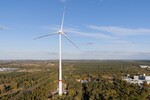News Release from windfair.net
Wind Industry Profile of
What if... U.S. Offshore Project Developer Publishes Interesting Mind Game
Background
In August 2016, the state of Massachusetts passed comprehensive legislation on energy diversity as part of a broad effort to reduce energy costs, strengthen the state's clean energy economy and meet regulatory emission standards.
In December 2017 then, the U.S. project developer Vineyard Wind submitted a proposal for the construction of an 800 MW offshore wind farm some 15 miles south of Martha's Vineyard. In addition, the grids are to be expanded to be able to transport 1,600 MW of electricity from all Massachusetts wind farms. Planned start of construction for the project is 2019, starting to operate in 2021.
At the beginning of this year, North America was hit by a particularly heavy snowstorm, a so-called 'bomb cyclone'. What makes a storm a' bomb' is the speed at which the air pressure falls. By definition, barometric pressure must drop by at least 24 millibars within 24 hours for a storm to be called a 'bomb cyclone', according to the New York Times. A cold spell, beginning after Christmas 2017 and lasting a good 14 days, then paired with a heavy snowstorm called 'Grayson' and had almost the entire United States under their grip.
Project developer Vineyard Wind has now published a scenario of thoughts on this subject: What if an 800 megawatt offshore wind farm had been located off the coast of New England at this point in time - as the company intends to build it by 2021? To answer this question, Daymark Energy Advisors has carried out a study to investigate on this.
Investigation period was January 4th through January 7th 2018, when the snowstorm on the coast of New England raged particularly violently. The focus was on economic and ecological aspects as well as the reliability of the local power supply, especially in the Cape Cod region.

Outcome
The wind farm* would have significantly reduced the impact of the storm on the environment and the electricity grid. There would have been 31 million dollars of energy savings in wholesale and 67,485 tons of carbon dioxide (CO2) would have been saved.
"The report clearly details the importance of developing offshore wind at the earliest possible date in Massachusetts," said Erich Stephens, Chief Development Officer of Vineyard Wind. "The sooner we start building the Commonwealth’s first offshore wind project, the sooner local residents and businesses will benefit from the abundant environmental and economic advantages that are associated with large-scale renewable and sustainable offshore wind energy."
Ramifications
The 800 MW wind farm proposed by Vineyard Wind is capable of generating enough electricity for 400,000 households. In the four days of the study period, it would have produced 61 million kilowatt hours of clean, emission-free energy based on the actual wind conditions recorded by an offshore measuring station on site.
In addition, the volume of electricity produced would have reduced regional wholesale electricity prices by almost $20 per megawatt hour (MWh), saving New England customers over $31 million and Massachusetts customers nearly $15 million.
Furthermore, CO2 emissions in New England would have been reduced by 67,485 metric tons, which is equivalent to the annual emissions of 14,358 cars. The direct feed-in of electricity into the region's networks would have led to a significant stabilisation of the local electricity grid. Instead, it threatened to collapse several times due to the blizzard.
Without an offshore wind farm, of course, the region has not yet been able to exploit all these advantages. The local electricity suppliers resorted to their gas and oil reserves, whose raw material prices have risen sharply as a result of strong demand. During the 14 days of cold weather that followed Christmas until the end of the storm, electricity generators in New England burned almost 2 million barrels of oil - more than they used in 2016 and 2017 combined.
Conclusion
Of course, the project developer wants to use this study to advertise his project. However, similar advantages also apply to many other regions in the U.S., where local governments (and residents) would do well to finally give up their resistance and start to take advantage of offshore wind energy.
*The study assumes that the offshore wind farm could have been operating at full capacity for almost the entire duration of the storm.
- Source:
- Vineyard Wind
- Author:
- Katrin Radtke
- Email:
- press@windfair.net
- Keywords:
- USA, bomb cyclone, offshore, wind energy, weather, snow, blizzard, electricity, grid, developer







